Complete Guide to Digital Agency Project Management [2025]
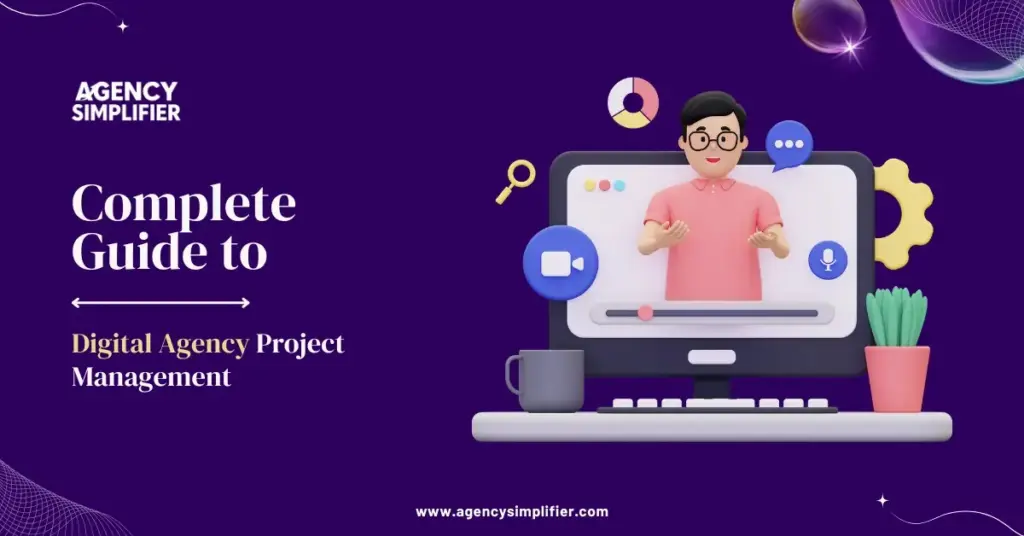
Let’s be honest. Agencies don’t fail because they lack talent. They fail because they lack structure. If your shop runs on last-minute updates, scattered emails, and shifting priorities, you bleed time, profit, and trust.
Strong project management for agencies gives you three things:
- Clear communication between teams and clients
- Predictable delivery across multiple projects
- Visibility into time, scope, and profitability
Whether you’re handling project management advertising campaigns or managing complex creative builds, this guide shows you exactly how to build reliable systems for planning, executing, and improving work in ad, creative, design, and digital marketing environments. You’ll also see where project management in advertising agencies differs from project management for marketing agency teams.
What Is Agency Project Management?
Agency project management isn’t your typical corporate PM. It’s the specialized discipline of orchestrating client projects in the chaotic, creative world of advertising, marketing, design, and digital agencies. Think of it as conducting a symphony where every musician is a creative genius, every song is different, and the audience keeps requesting changes mid-performance.
Here’s what makes it different from regular project management: you’re juggling multiple clients simultaneously, creative work is subjective and iterative, deadlines are often non-negotiable (especially in ad agency project management), and client relationships are everything.
The Benefits and Importance of Agency Project Management for Marketers
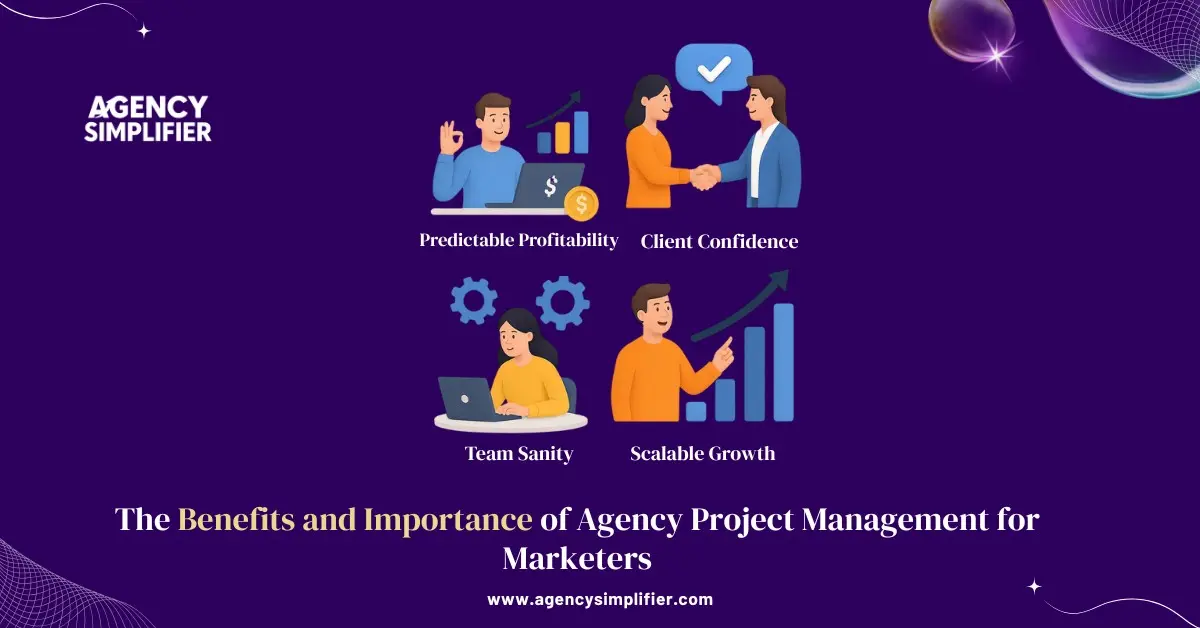
Here’s why getting your PM right transforms everything:
- Predictable Profitability: No more projects that mysteriously lose money halfway through. Proper creative agency project management means you know exactly where your time and budget stand at any moment.
- Client Confidence: When clients see consistent communication, on-time delivery, and transparent progress tracking, they stop micromanaging and start trusting. This leads to bigger budgets and longer relationships.
- Team Sanity: Your creatives can actually focus on creating instead of wondering what they’re supposed to be working on. Your project manager ad agency role becomes strategic rather than firefighting.
- Scalable Growth: With documented processes and clear workflows, taking on new clients doesn’t mean chaos multiplies. Your design agency project management systems work whether you’re handling 5 projects or 50.
Agency Project Management Lifecycle: 7 Essential Steps
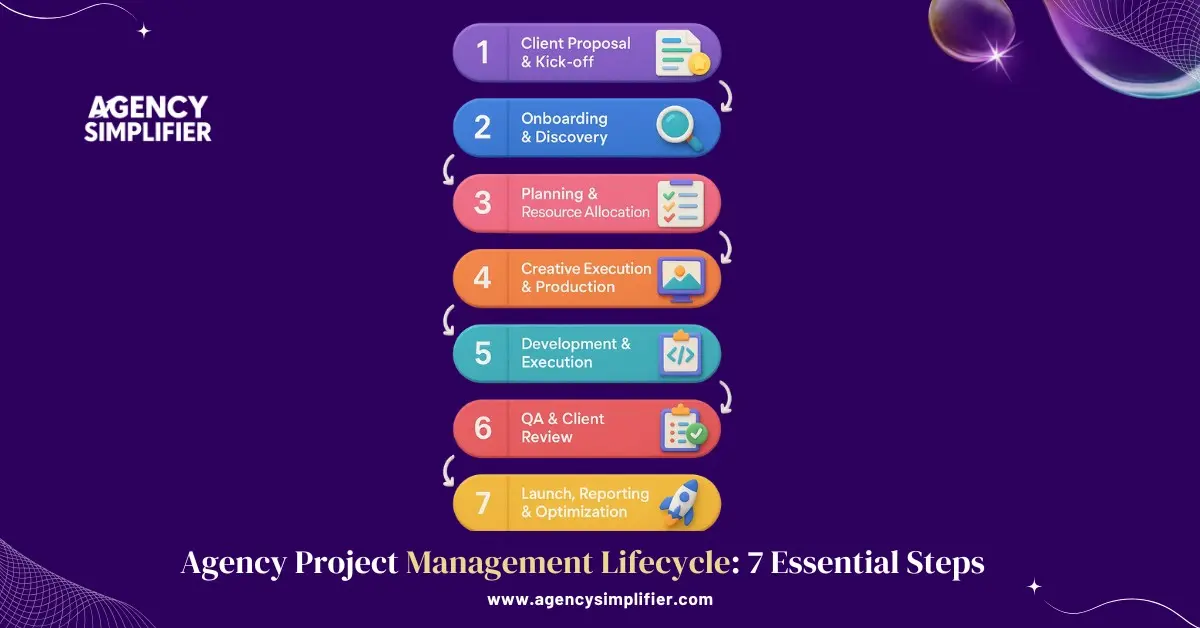
Every successful agency project management approach follows this battle-tested sequence. Whether you’re running project management for creative agencies or handling project management in digital marketing, these phases keep you sane and profitable.
1. Client Proposal & Kick-off
This isn’t just sending a quote and hoping for the best. A smart project manager advertising agency professional uses this phase to confirm scope, set expectations, and identify potential landmines before they explode.
Create detailed project briefs that capture not just what the client wants, but why they want it. Use RACI matrices to clarify who’s responsible for what. Set communication cadences upfront—how often you’ll update them, through which channels, and what decisions need their input versus your team’s judgment.
2. Onboarding & Discovery
Time to become detectives. Audit their existing assets, analyze competitors, and dig into their actual business goals (not just what they think they want). For project management in advertising agencies, this might mean understanding their brand guidelines, previous campaign performance, and internal approval processes.
Set specific, measurable KPIs that everyone agrees on. Vague goals like “increase brand awareness” kill projects. Concrete targets like “achieve 15% increase in website traffic from target demographic” keep everyone aligned.
3. Planning & Resource Allocation
Here’s where great creative agency project management separates itself from wishful thinking. Build realistic timelines based on your team’s actual capacity, not superhuman expectations.
Map out who’s doing what when, and build in buffers for the inevitable “quick changes” that aren’t quick. Use capacity planning tools to avoid overloading your star performers while underutilizing others.
4. Creative Execution & Production
This is where the magic happens—if you’ve done the previous steps right. Structure your creative process with clear review gates. Keep feedback cycles time-boxed and organized. Whether it’s design agency project management for a website or campaign creative for ads, protect your team’s focus time while maintaining quality standards.
5. Development & Execution
Launch time. Coordinate all the moving pieces—media placements, technical builds, content deployment. Track progress obsessively and surface risks before they become problems. An experienced ad project manager knows this phase makes or breaks client relationships.
6. QA & Client Review
Test everything against specifications. Run structured approval processes through centralized systems. Manage versions and change requests with clear impact documentation. This phase protects both your reputation and sanity.
7. Launch, Reporting & Optimization
Execute the launch, monitor KPIs religiously, and share results through client-friendly dashboards. Capture learnings in detailed post-mortems. The best project management for marketing agencies approaches treat every project as a learning opportunity for the next one.
Project Management Methodologies for Agencies
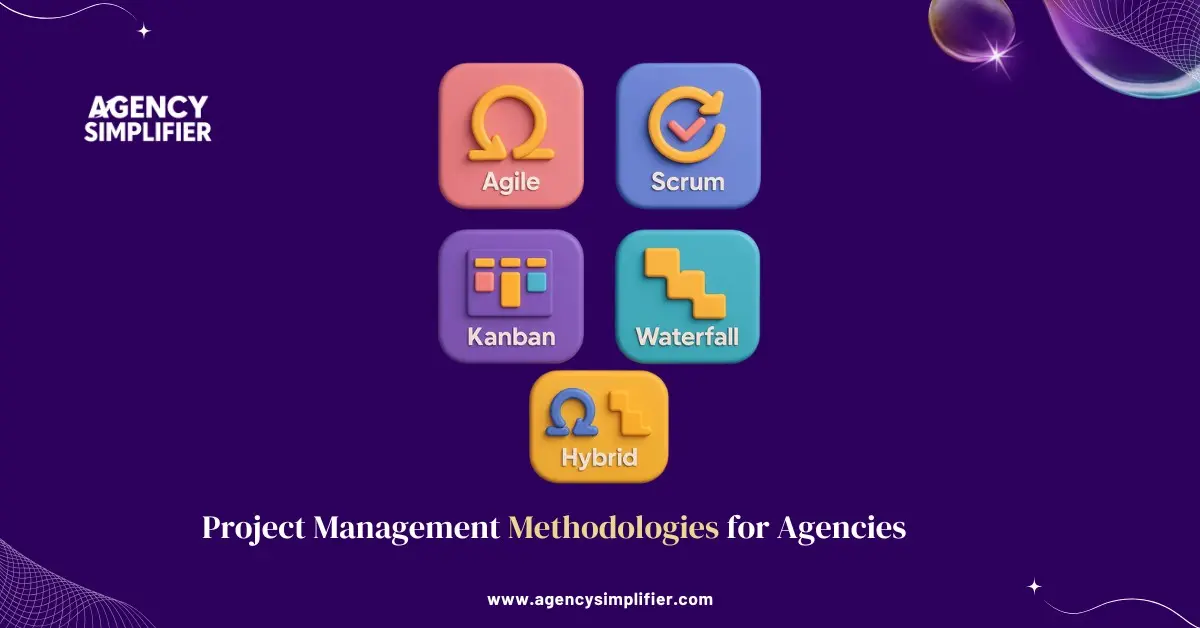
Not all methodologies work for agency life. Here’s what actually works in real agency environments:
- Agile: Perfect for creative agency project management where requirements evolve and creative iteration improves outcomes. Short sprints, frequent client feedback, adaptive planning. Great for campaigns where you’re learning and adjusting as you go.
- Scrum: Excellent for complex project management for marketing agencies involving multiple specialists. Daily standups keep everyone aligned, sprint reviews ensure progress, and retrospectives drive continuous improvement.
- Kanban: Ideal for ongoing project management advertising work where priorities shift daily. Visual boards show work flow, WIP limits prevent overwhelm, and continuous delivery keeps clients happy.
- Waterfall: Still valuable for design agency project management projects with fixed requirements brand identities, website redesigns, traditional campaigns with firm launch dates.
- Hybrid: Most successful agencies mix approaches. Use Scrum for campaign development, Kanban for ongoing production, Waterfall for compliance projects.
Pick based on project type, not personal preference. A project manager advertising agency professional adapts methodology to project needs, not the other way around.
Choosing Project Management Software for Digital Agencies
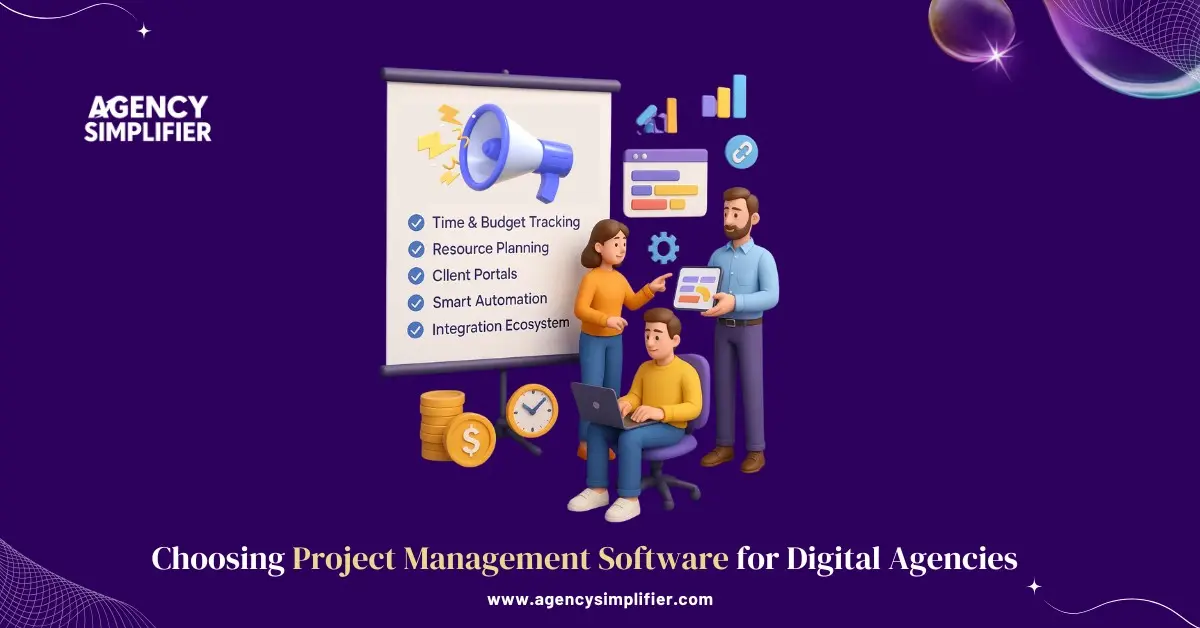
The wrong tool kills productivity. The right one transforms your agency. Here’s what actually matters when selecting project management software for digital agencies:
Must-Have Features
Time & Budget Tracking: Connect hours to tasks, projects to profitability. Automatic invoicing saves admin time.
Resource Planning: Visual capacity views prevent overloading while identifying development opportunities.
Client Portals: Let clients track progress, provide feedback, and access deliverables without email chaos.
Smart Automation: Handle status updates, deadline reminders, approval routing automatically.
Integration Ecosystem: Connect with your CRM, billing, creative tools, and analytics platforms.
Top Recommendations
Agency Simplifier: All-in-one platform built specifically for agencies. Combines project management, client collaboration, and reporting.
Asana: Flexible, user-friendly, great for growing teams. Strong free tier.
ClickUp: Highly customizable with powerful automation. Perfect for agencies wanting control over every detail.
monday.com: Visual excellence with strong collaboration features. Great for client-facing work.
Forecast: Advanced resource planning with AI insights. Ideal for optimizing team utilization.
Common Challenges & Solutions in Agency Project Management
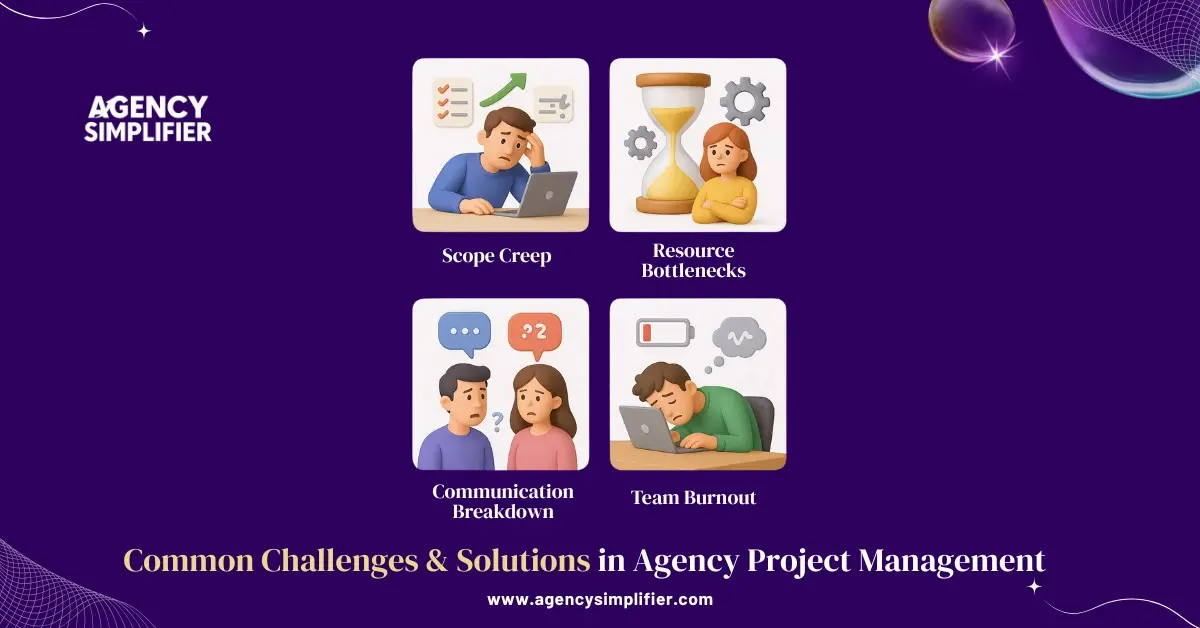
Real problems need real solutions. Here’s what actually derails agency project management and how to fix it:
1. Scope Creep
The Problem: “Quick changes” that multiply into project overhauls. Particularly brutal in project management in advertising agencies where timelines are tight.
The Solution: Document scope obsessively. Create formal change control processes. Build buffers into timelines. Educate clients about change impacts upfront.
2. Resource Bottlenecks
The Problem: Star players become chokepoints while others sit idle. Common when an ad project manager juggles multiple high-pressure campaigns.
The Solution: Visual capacity planning, skills matrices, cross-training programs, weekly capacity reviews.
3. Communication Breakdown
The Problem: Information scattered across emails, decisions lost, stakeholders confused.
The Solution: Centralized communication platforms, standardized update protocols, decision logs, single sources of truth.
4. Team Burnout
The Problem: Unrealistic expectations drain creative energy in project management for creative agencies.
The Solution: Realistic velocity planning, work-in-progress limits, protected creative time, automated admin tasks.
Future Trends: AI, Automation & Data-Driven Agency PM
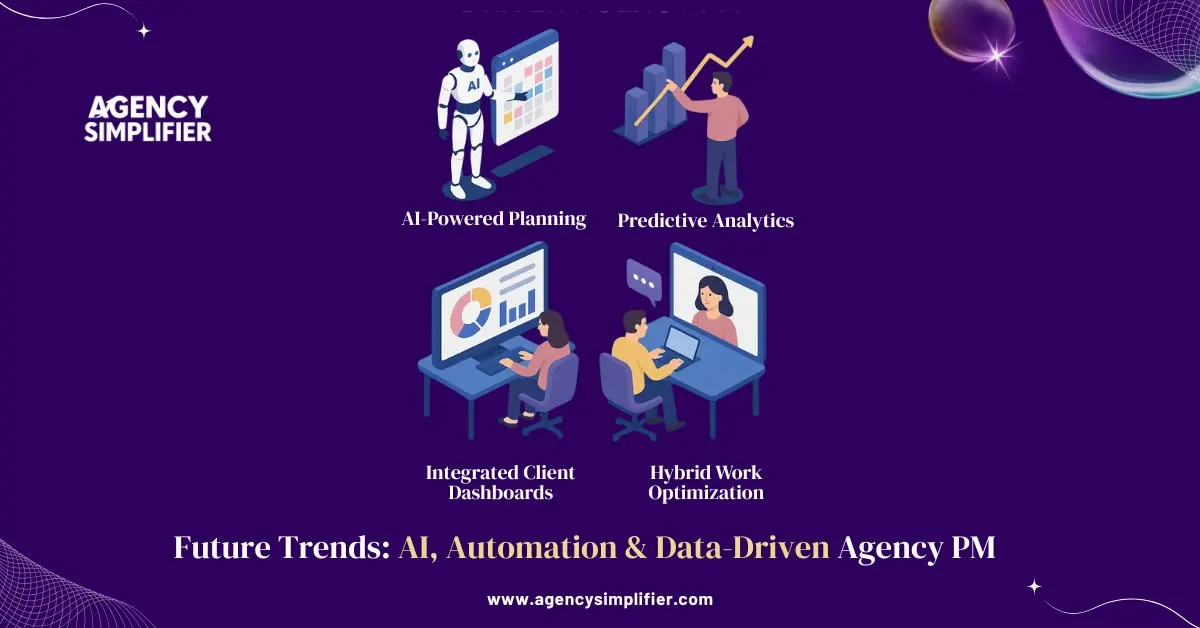
The PM landscape is evolving fast. Here’s what’s changing project management for agencies:
- AI-Powered Planning: Smart systems predict project risks, optimize resource allocation, and automate complex scheduling. This frees project manager ad agency professionals for strategy and client relationships.
- Predictive Analytics: Data-driven insights forecast project outcomes, recommend timeline adjustments, and identify optimization opportunities before problems emerge.
- Integrated Client Dashboards: Real-time visibility into progress and results without constant status meetings. Clients get transparency, you get time back.
- Hybrid Work Optimization: Async-first workflows, outcome-based planning, seamless collaboration across locations and time zones.
Conclusion & Next Steps
Exceptional agency project management in 2025 isn’t about having the most sophisticated tools or perfect processes. It’s about creating reliable systems that let talented people do their best work while keeping clients happy and projects profitable.
The agencies winning today combine creative excellence with operational discipline. They’ve moved beyond heroic individual efforts to sustainable, scalable systems that deliver consistent results.
Your next steps:
- Audit your current processes honestly
- Pick one methodology that fits your dominant project type
- Choose tools that match your team size and complexity
- Document your workflows and train your team
- Measure, learn, and improve continuously
Whether you’re handling creative agency project management, design agency project management, or project management in digital marketing, the fundamentals remain the same: clear communication, realistic planning, and continuous improvement.
Ready to transform your agency operations? Start with the biggest pain point, implement one improvement at a time, and build momentum through small wins that compound into major operational advantages.
FAQ: Project Management for Agencies
Q1: What’s the difference between agency project management and general PM?
Ans: Agency project management is client-facing, creative-focused, and fast-paced with frequent approval cycles across multiple simultaneous projects. It requires balancing creative iteration with strict deadlines while managing complex stakeholder relationships.
Q2: Do small agencies need enterprise-grade PM tools?
Ans: Not necessarily. Start with flexible platforms that match your workflow and budget. Upgrade as complexity increases. Focus on adoption and usage over features.
Q3: How do I become a certified ad project manager?
Ans: Build hands-on experience with campaigns, pursue PMP or Agile certifications, understand creative workflows and media planning. An ad project manager needs both technical PM skills and creative industry knowledge.
Q4: What are best practices for project management for marketing agencies?
Ans: Clear scope definition, structured communication, standardized templates, centralized platforms, regular reviews. Balance creative flexibility with systematic processes. Most importantly, treat every project as a learning opportunity for improvement.
Shripad Deshmukh
Shripad Deshmukh, founder of Agency Simplifier, brings over 15 years of experience in custom SaaS development and product management. With a strong focus on digital transformation and multi-platform customer experiences.